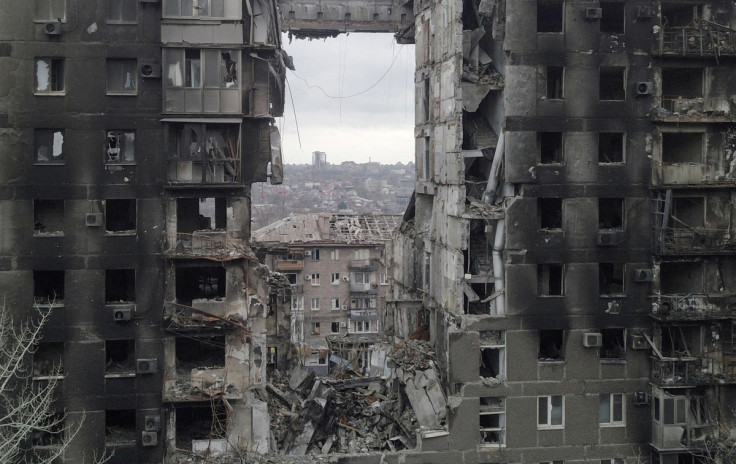Ukraine Says Eight Villages Retaken From Russian Forces In Two Weeks

Ukraine confirmed on Monday it had driven Russian forces from an eighth village in its two-week-old counteroffensive in a heavily fortified part of the front line on the most direct route to the country's Azov Sea coast.
A Russian-installed official said on Sunday that Ukraine had taken control of the village, Piatykhatky, in the southern Zaporizhzhia region. He later said Moscow had pushed them out and on Monday morning he said Ukraine was attacking again.
Ukraine's Deputy Defence Minister Hanna Maliar said Ukrainian forces had not only retaken Piatykhatky but had advanced by up to seven km (4.3 miles) into Russian lines in two weeks, capturing 113 square km (44 square miles) of land.
"In the course of two weeks of offensive operations in the Berdiansk and Melitopol directions, eight settlements were liberated," Maliar said on Telegram, refering to two cities on the Russian-occupied coastline.
The reported capture of the villages reflects incremental gains for Ukraine that highlight the challenge of breaking through lines Moscow has spent months strengthening. Piatykhatky is significant, however, as lies around 90 km from the coast.
Ukrainian President Volodymyr Zelenskiy hailed the efforts of the troops and said he would continue talks with Western allies to get weapons and ammunition supplies to them as soon as possible.
"Our troops are advancing, position by position, step by step, we are moving forward," he said on Sunday evening. "The main thing is the speed of supply."
On Monday, the Russian Defence Ministry said its forces had thwarted a Ukrainian attempt to take the village of Novodonetske in the eastern Donetsk region, one of the areas where Kyiv's counteroffensive has been focused.
It released a video showing what a soldier heard talking in what it said was a captured French-made tank. Kyiv did not comment and Reuters could not verify the latest battlefield accounts.
Ukraine has acknowledged attacks along several parts of the 1,000 km (600 mile) front line in its long-anticipated counteroffensive to retake the 18% of its territory occupied by Russia.
But Kyiv has imposed an information blackout on current and future battles for security reasons. Analysts say the main phase of the counteroffensive is yet to begin.
Both sides appear to have taken heavy losses in recent fighting and both say they have lost fewer troops than their foes.
"The enemy's 'wave-like' offensives yielded results, despite enormous losses," Russian-installed official Vladimir Rogov said on Telegram in reporting the Piatykhatky fighting.
REDEPLOYMENT?
While Ukraine conducts what Western governments and analysts say are probing attacks to test Russian forces, officials from two NATO member states said Moscow is redeploying some of its forces as it seeks to predict where Ukraine will strike.
Britain and Estonian intelligence officials said that Russia had been moving some forces east along the front line from areas south of the Dnipro river flooded by the destruction of the huge Kakhovka hydroelectric dam on June 6.
Estonia said the Ukrainians were approaching the counter-offensive methodically.
"We won't see an offensive over the next seven days," Estonia's ERR news quoted the commander of the Estonian Defense Forces intelligence centre, Colonel Margo Grosberg as saying on Friday.
Russia and Ukraine have blamed each other for the unleashing of a reservoir the size of the U.S. Great Salt Lake. Flooding has destroyed homes and farmland across a swathe of southern Ukraine along both sides of the front line in Kherson region. The death toll has risen to 52, with more than 11,000 people evacuated.
Moscow and Kyiv have blamed each other for the attack, while a team of legal experts helping Ukraine investigate said on Friday it was "highly likely" that dam's collapse was caused by explosives planted by Russians.
The flooding has made any cross-river attack in the area exceedingly difficult, Michael Kofman, a military analyst, wrote on Twitter, although it would always have been a risky operation.
Ukrainian officials say more than half of the areas affected by the flooding lie on the Russian side and affected area likes on the Russian-occupied side of the river and Russia's Defence Ministry warned on Monday that mosquito-borne diseases such as West Nile Fever could break out in the area.
The United Nations said on Sunday that Moscow had declined its help to assist residents affected by the breach.
"Aid cannot be denied to people who need it," Denise Brown, U.N. humanitarian coordinator for Ukraine, said in a statement.
© Copyright Thomson Reuters 2024. All rights reserved.











